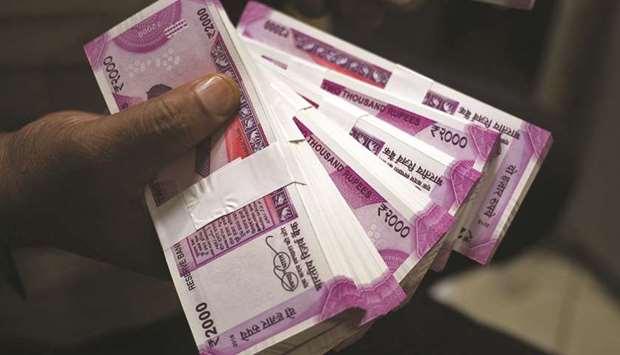The Indian rupee yesterday weakened the most against the US dollar since September 2013 after the government scrapped the article that granted special status to Jammu & Kashmir, heightening political uncertainty in the region.
The fall in currency was also in line with its other Asian peers amid speculation Beijing may allow currency depreciation to counter President Donald Trump’s latest tariff threat.
The rupee ended 1.6% lower at 70.73 a dollar, its steepest fall since September 3, 2013. On Friday, it closed at 69.60. The local currency opened at 70.06 and touched a low of 70.72 a dollar. So far this year, it declined 1.3%.
The Centre yesterday scrapped Article 370 of the Constitution that grants special status to Jammu and Kashmir, with an order saying “it shall come into force at once”. The abrogation follows the Centre introducing the Jammu and Kashmir Reorganisation Bill in Parliament.
Meanwhile India stocks fell, joining peers across Asia, as an escalating tariff dispute between the US and China triggered a sell-off across the region. A key gauge entered into a technical correction from its record close in June.
The benchmark S&P BSE Sensex declined 1.1% to 36,699.84 points in Mumbai. The NSE Nifty 50 Index lost 1.2%, falling more than 10% from its all-time high close on June 3, a retracement seen as a technical correction, wiping out its 2019 gain.
The MSCI Asia Pacific Index dropped with shares slumping in markets from Sydney to Shanghai. China allowed the yuan to tumble to its weakest level in a decade against the dollar and asked state-owned companies to suspend imports of US agricultural products.
At home, signs of slowing demand and the absence of government measures to stimulate growth remain a drag on sentiment.
The Reserve Bank of India announces monetary policy on Wednesday, with the market broadly pricing in a rate cut this week and another in the next six months.
Investors are also closely watching developments in Kashmir after the Indian government revoked its special constitutional status in a move that’s drawn protests in parliament and risks worsening its already tense relationship with rival Pakistan in the disputed region.
“The economic slowdown is likely to continue and the April-June growth numbers will show the same. At such a time, global trade headwinds are strong and we expect US President Donald Trump to continue with a tough stance against China,” said Aneesh Srivastava, chief investment officer at IDBI Federal Life Insurance Company.
“Government has displayed strong political will and decisiveness in order to fulfil one of its poll promises related to Jammu & Kashmir,” said Rajiv Singh, chief executive officer at Karvy Stock Broking Ltd. “We expect it to take similar bold moves in case of addressing economic slowdown, recent taxation measures which have dampened sentiment.”
Sixteen of 19 sector indexes compiled by BSE Ltd declined, led by a gauge of utilities companies Reliance Industries contributed the most to the index decline, decreasing 3.5%. Yes Bank had the largest drop, falling 8.2%.
Meanwhile, the yuan plunged below 7 per dollar for the first time since 2008 after US President Donald Trump abruptly decided to impose new tariffs on Chinese goods, escalating the trade war with China. Beijing pledged to respond if the US goes ahead with its plan to impose 10% tariff on a further $300bn in Chinese imports.
“First, the Fed became the second major Central Bank (after ECB last week) to disappoint markets, as it delivered a less than dovish cut of 25bp. To add to the woes, Trump announced another round of tariffs on the last remaining tranche of Chinese imports. China has already warned of retaliation and now all eyes will be on how China reciprocates, and everything else will likely take a backseat for now, in our view”, said Nomura Research in a note.
“Geopolitical and trade tensions continue to rise, with the US withdrawing from a nuclear treaty with Russia, North Korea conducting another missile test, and Japan-South Korea threatening to remove each other from trade whitelists, which could further dampen the growth outlook for the region,” it added.
So far this year, foreign investors have bought $9.24bn in local equities and $2.49bn in domestic debt.
Among Asian currencies, China Offshore was down 1.62%, South Korean won lost 1.46%, China renminbi fell 1.43%, Philippines peso declined 0.84%, Taiwan dollar was down 0.78%, Indonesian rupiah fell 0.49%, Malaysian ringgit declined 0.47%, Singapore dollar fell 0.34%, Hong Kong dollar lost 0.14%, and Thai baht 0.12%. However, Japanese yen was up 0.52%.

The rupee ended 1.6% lower at 70.73 a dollar yesterday, its steepest fall since September 3, 2013
